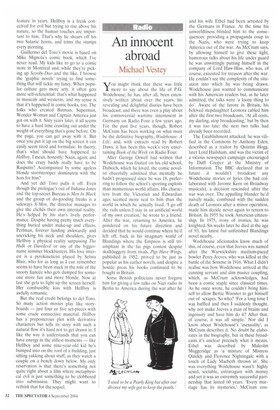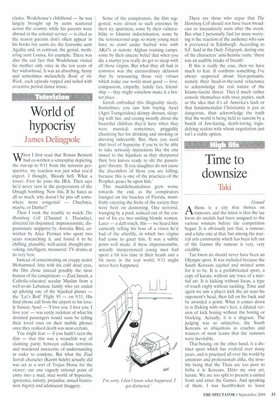An innocent abroad
Michael Vestey
you might think that there was little more to say about the life of P.G. Wodehouse; he has, after all, been extensively written about over the years, his revealing and delightful diaries have been broadcast, and there was even a play about his controversial wartime internment in Germany on Radio Four a few years ago. For the past five years, though, Robert McCrum has been working on what must be the definitive biography, Wodehouse: A Life, and, with extracts read by Robert Daws, it has been this week's very entertaining Book of the Week on Radio Four.
After George Orwell had written that Wodehouse was fixated on his old school, Dulwich, which he loved, the comic novelist cheerfully admitted that mentally he hadn't progressed since he was 18, preferring to follow the school's sporting exploits than momentous world affairs. His characters from the Victorian and Edwardian ages seemed more real to him than the world in which he actually lived. 'I go off the rails unless I stay in an artificial world of my own creation,' he wrote to a friend. After the war, returning to America, he pondered on his future direction and decided that he would continue where he'd left off, back in his imaginary world of Blandings where the Empress is still triumphant in the fat pigs contest despite skullduggery from rivals. Pigs Have Wings, published in 1952, proved to be just as popular as his earlier novels, and despite a hostile press his books continued to be bought in Britain.
Some British politicians never forgave him for giving a few talks on Nazi radio in Berlin to America during the war after he and his wife Ethel had been arrested by the Germans in France. At the time his unworldliness blinded him to the consequences: providing a propaganda coup to the Nazis, who were trying to keep America out of the war. As McCrum says, by allowing himself to give these light, humorous talks about his life under guard he was unwittingly putting himself in the company of Lord Haw-Haw, who was, of course, executed for treason after the war. He couldn't see the complexity of the situation into which he was being drawn. Wodehouse just wanted to communicate with his American readers but, as he later admitted, the talks were 'a loony thing to do'. Aware of the furore in Britain, his beloved stepdaughter Leonora cabled him after the first two broadcasts, 'At all costs, my darling, stop broadcasting,' but by then it was too late; the next two talks had already been recorded.
The Establishment attacked; he was vilified in the Commons by Anthony Eden, described as a traitor by Quintin Hogg, later Lord Hailsham, and was the victim of a vicious newspaper campaign encouraged by Duff Cooper at the Ministry of Information. The BBC declared that in future it wouldn't broadcast any Wodehouse stories or lyrics (he had collaborated with Jerome Kern on Broadway musicals), a decision rescinded after the war was over. The appalling blunder he'd naively made, combined with the sudden death of Leonora after a minor operation, made him decide never again to return to Britain. In 1955 he took American citizenship. In 1975, irony of ironies, he was knighted. Six weeks later he died at the age of 93, his latest but unfinished Blandings novel nearby.
Wodehouse aficionados know much of this, of course, even that Jeeves was named after the Warwickshire medium-paced bowler Percy Jeeves, who was killed at the battle of the Somme in 1916. What I didn't realise was how Wodehouse arrived at the cunning servant and dim master coupling, which, as McCrum acknowledges, had been a comic staple since classical times. As he once wrote, he couldn't bring himself to allow Bertie Wooster to get himself out of scrapes. So who? 'For a long time I was baffled and then I suddenly thought, why not make Jeeves a man of brains and ingenuity and have him do it? After that, of course, it was all simple.' Nor did I know about Wodehouse's 'asexuality', as McCrum describes it. No doubt he elaborates in the biography, but in these broadcasts it's unclear precisely what it means. Ethel was described by Malcolm Muggeridge as 'a mixture of Mistress Quickly and Florence Nightingale with a touch of Lady Macbeth thrown in'. She was everything Wodehouse wasn't: highly sexed, sociable, extravagant with money and yet it was an extremely successful partnership that lasted 60 years. 'Every marriage has its mysteries,' McCrum con
eludes. Wodehouse's childhood — he was largely brought up by aunts scattered across the country while his parents were abroad in the colonial service — is cited as the reason parents don't often appear in his books but aunts do; the fearsome aunt Agatha and, in contrast, the genial, mothering aunt Louisa, for example. There was also the sad fact that Wodehouse visited his mother only once in the ten years of her widowhood. It was an absorbing, funny and sometimes melancholy Book of the Week, each episode topped and tailed with evocative period dance music.



































































 Previous page
Previous page